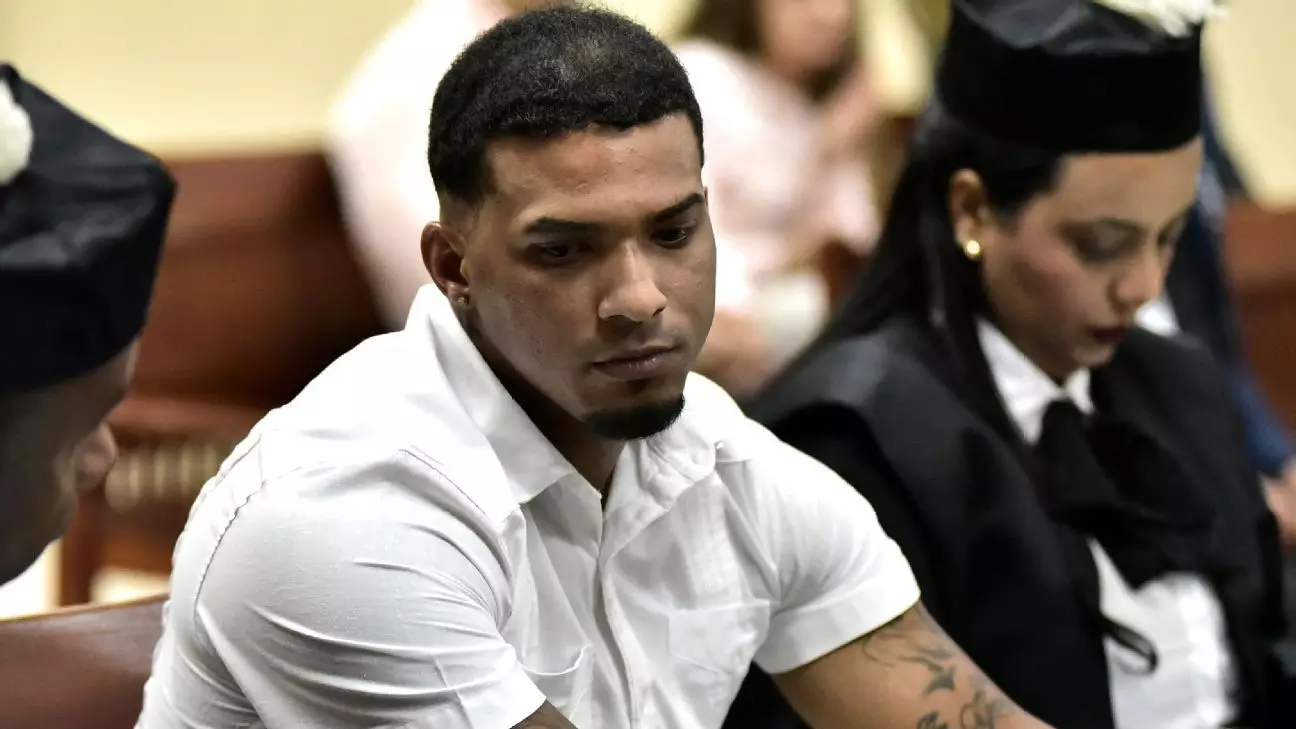Wander Franco, hailed as one of baseball’s brightest prospects, has seen his career unravel spectacularly in the wake of serious allegations that not only question his integrity but also reflect a darker facet of sports culture. Once the pride of the Tampa Bay Rays and a cornerstone of their future, Franco’s actions overshadowed his achievements and raised uncomfortable questions about the environment that nurtures talent at all costs. The disturbing verdict against him not only ends his shining season but poses a significant moral dilemma for fans, the league, and young players who look up to him.
Franco’s meteoric rise was characterized by not just skill but immense potential. At age 20, he burst onto the Major League Baseball scene with a remarkable debut. The Rays were quick to lock him into what was considered a groundbreaking contract, entrusting him with their franchise’s future. However, this trajectory took a sinister turn when allegations surfaced regarding his inappropriate relationship with a minor—the very opposite of the role model we expect from our sports icons.
A Troubling Verdict
The Dominican Republic’s judicial system delivered a controversial verdict: a suspended two-year prison sentence. The verdict seemed to reflect a judicial leniency that raises eyebrows, particularly in a scenario that involves the exploitation of a minor. Judge Jakayra Veras’s decision to spare Franco any immediate imprisonment unless he reoffends seems both inadequate and troubling, particularly given the nature of his crime. This leniency sends a disconcerting message about accountability in elite sports circles where fame and talent often divert attention from character flaws.
Adding to the tragic narrative is the involvement of Martha Vanessa Chevalier Almonte, the minor’s mother, who was likewise convicted and richly deserved her ten-year sentence for trafficking her own daughter. The intertwining of Franco’s legal troubles and the exploitation imposed by a parent is emblematic of systemic failures in safeguarding the vulnerable. It raises complexities around parental responsibility and societal complicity, pulling into question how many layers of betrayal were at play in this situation.
Impacts on Baseball and Reputation
The consequences for Franco extend beyond the court’s decision. Major League Baseball has its eyes firmly fixed on him, alluding to potential severe repercussions under their domestic violence, sexual assault, and child abuse policies. It acts as a necessary but stark reminder that professional athletes are not above the law, no matter how dazzling their performance on the field may be. The ironic twist of fate is that a career that seemed filled with promise may now hinge on paperwork and a work visa—a punishment he co-created with his actions.
Social media further complicates this situation. Franco’s initial denial of the allegations has been met with skepticism, as digital footprints became a double-edged sword for public perception. The hastily forwarded narratives on platforms like Twitter can shape opinions much faster than actual investigations can unfold, forcing athletes into a realm of public scrutiny where every move is criticized, and every action is dissected. In this spotlight, even the context of one’s past accomplishments can evaporate, replaced by scandal and condemnation.
The Ethical Reckoning in Sports
Franco’s case encapsulates an urgent ethical reckoning within sports. It raises questions about how far we as a society will go in protecting our icons, often prioritizing talent over moral character. As the lines between personal and professional life blur under the glare of media attention, there’s an urgent need for comprehensive dialogue about player conduct, ethics, and the responsibility that comes with fame.
In an age where societal accountability is ever-increasing, the Wander Franco saga should serve as a crucial touchpoint for discussions around player behavior and the expectations placed on them. Athletes are not merely entertainers; they are role models with the power to influence future generations. This catastrophe in Franco’s life serves as an undeniable reminder that talent must never eclipse moral obligation. To advocate for a sports culture that embraces integrity and victim protection, the community must rally for change—starting with holding those in power accountable and ensuring a safer environment for the youth it influences.


Leave a Reply